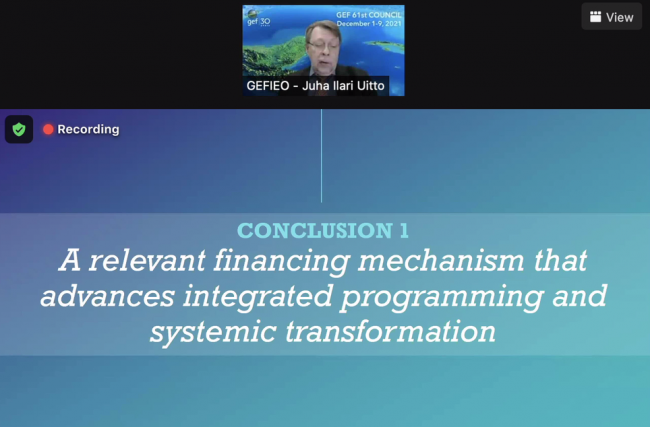The second day of the 61st meeting of the GEF Council began with an executive session during which Council Members discussed the agenda items related to the UN Development Programme (UNDP). The Council Members will continue their discussion on these items on Wednesday, 8 December. The GEF Council also discussed the share of GEF financing in Agencies’ portfolios and the seventh comprehensive evaluation of GEF results and performance.
Reporting on the Share of GEF Financing in Agencies’ Portfolio
Françoise Clottes, GEF Secretariat, explained that two issues have been discussed with regard to this item: relative levels of GEF financing in each GEF Agency’s overall operations, and concentration of GEF funding for each implementing Agency. Clottes said the report addresses the former issue and finds that for all Agencies, the level of GEF financing in their overall operations is well below the 30% ceiling. As a result, she said, the proposed decision does not recommend additional measures beyond light monitoring of the issue going forward.
During discussion, Council Members inquired about the distinction between Agency focus and the share of GEF funding, and highlighted the need to increase the number of Agencies that can be considered for project funding. Several stressed that countries must retain the ability to choose the Agencies that will implement their GEF projects.
The Council adopted the draft decision which calls for the Secretariat to monitor this issue and submit a recommendation to the Council if it is determined that additional measures are warranted in the future.
Seventh Comprehensive Evaluation of the GEF
On the agenda item titled, “Working Toward A Greener Global Recovery - Executive Summary of OPS7,” Council Members considered a report by the Independent Evaluation Office (IEO) of the GEF. The report, which was prepared to inform the eighth replenishment of the GEF Trust Fund (GEF-8), summarizes the seventh comprehensive evaluation of GEF results and performance, and is organized along three themes: what works in the GEF; how things work in the GEF; and why things work in the GEF. GEF management provided a response to the report, following which Council Members offered questions and comments.
Juha Uitto, Director, GEF IEO, outlined the eight conclusions from the evaluation, including the continuing relevance of the GEF, and the GEF’s strong performance record, with 80% of projects rated as satisfactory on outcomes and 68% on sustainability.
Many speakers emphasized the value of keeping the GEF as a learning institution, and emphasized the need for responsive management. They called for strengthening country ownership and the Country Support Program in particular, including through support of the operational focal points. The need for an overall country engagement strategy was also mentioned.
Some speakers noted the need to close the gap between having good policies on paper and implementing them effectively. Several supported streamlining the application process while providing a robust review of project design.
Some supported creating a specific window that would have more tolerance of risk. Others asked how the GEF defines an acceptable level of risk. A few Members noted the relevance of peace and security concerns for this discussion.
Several Members requested a document that outlines all steps GEF management will take in response to the evaluation report. Many speakers welcomed the GEF’s focus on the least developed countries and small island developing States.
The second day concluded at 12:00 PM EST. Discussions on Wednesday, 8 December, are expected to include the report of the Chairperson of the Scientific and Technical Advisory Panel (STAP) and relations with Conventions and other international institutions.
To receive free coverage of global environmental events delivered to your inbox, subscribe to the ENB Update newsletter.























